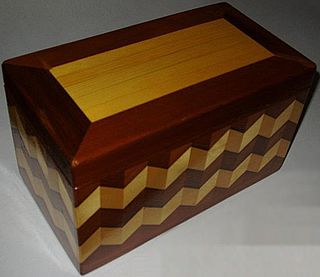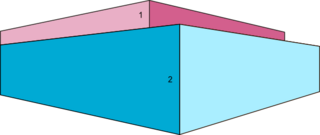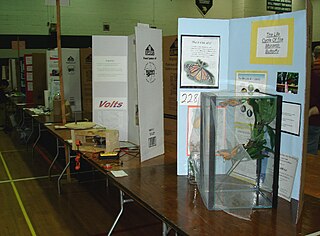This page is based on this
Wikipedia article Text is available under the
CC BY-SA 4.0 license; additional terms may apply.
Images, videos and audio are available under their respective licenses.

A staple is a type of two-pronged fastener, usually metal, used for joining or binding materials together. Large staples might be used with a hammer or staple gun for masonry, roofing, corrugated boxes and other heavy-duty uses. Smaller staples are used with a stapler to attach pieces of paper together; such staples are a more permanent and durable fastener for paper documents than the paper clip.

Box describes a variety of containers and receptacles for permanent use as storage, or for temporary use, often for transporting contents.

Paperboard is a thick paper-based material. While there is no rigid differentiation between paper and paperboard, paperboard is generally thicker than paper and has certain superior attributes such as foldability and rigidity. According to ISO standards, paperboard is a paper with a grammage above 250 g/m2, but there are exceptions. Paperboard can be single- or multi-ply.

Optical disc packaging is the packaging that accompanies CDs, DVDs, and other formats of optical discs. Most packaging is rigid or semi-rigid and designed to protect the media from scratches and other types of exposure damage.

A carton is a box or container usually made of paperboard and sometimes of corrugated fiberboard.
Many types of cartons are used in packaging. Sometimes a carton is also called a box.

Paper pallets, or ecopallets, are shipping or display pallets made from paperboard.

Cardboard boxes are industrially prefabricated boxes, primarily used for packaging goods and materials and can also be recycled. Specialists in industry seldom use the term cardboard because it does not denote a specific material.
RockTenn was an American paper and packaging manufacturer based in Norcross, Georgia. In 2015, it merged with MeadWestvaco to form the WestRock company.
Coated paper is paper which has been coated by a mixture of materials or a polymer to impart certain qualities to the paper, including weight, surface gloss, smoothness or reduced ink absorbency. Various materials, including Kaolinite, calcium carbonate, Bentonite, and talc can be used to coat paper for high quality printing used in packaging industry and in magazines. The chalk or china clay is bound to the paper with synthetic viscosifiers, such as styrene-butadiene latexes and natural organic binders such as starch. The coating formulation may also contain chemical additives as dispersants, resins, or polyethylene to give water resistance and wet strength to the paper, or to protect against ultraviolet radiation.
Cardboard furniture is a furniture designed to be made from corrugated fiberboard, heavy paperboard, or fiber tubes.

The folding carton created the packaging industry as it is known today, beginning in the late 19th century. The process involves folding carton made of paperboard that is printed, laminated, cut, then folded and glued before transport to packagers. The cartons are shipped flat to a packager, which has its own machinery to fold the carton into its final shape as a container for a product. The classic example of such a carton is a cereal box.

Industria Cartaria Pieretti (icP) is an Italian company which produces cardboard for industrial use, made starting from waste paper. Its headquarters are in Marlia, inside the Lucca paper district.

Cardboard modeling or cardboard engineering is a form of modelling with paper, card stock, paperboard, and corrugated fiberboard. The term cardboard engineering is sometimes used to differentiate from craft of making decorative cards. It is often referred to as paper modelling although in practice card is generally used.
Iggesund Paperboard is a commission company of the Holmen Group and Europe's third largest manufacturer of high quality virgin fibre paperboard. Iggesund has a market share of about 20% in this sector.

Solid unbleached board, also known as SUB, is a grade of paperboard typically made of unbleached chemical pulp. Most often it comes with two to three layers of mineral or synthetic pigment coating on the top and one layer on the reverse side. Recycled fibres are sometimes used to replace the unbleached chemical pulp.

Corrugated box design is the process of matching design factors for corrugated fiberboard boxes with the functional physical, processing and end-use requirements. Packaging engineers work to meet the performance requirements of a box while controlling total costs throughout the system.

The pizza box or pizza package is a folding box made of cardboard in which hot pizzas are stored for takeaway. The "pizza box" also makes home delivery and takeaway substantially easier. The pizza box has to be highly resistant, cheap, stackable, thermally insulated to regulate humidity and suitable for food transportation. In addition, it provides space for advertising. The pizza packages differ from those of frozen pizzas, which contain the frozen product in heat-sealed plastic foils as is the case with much frozen food.


















